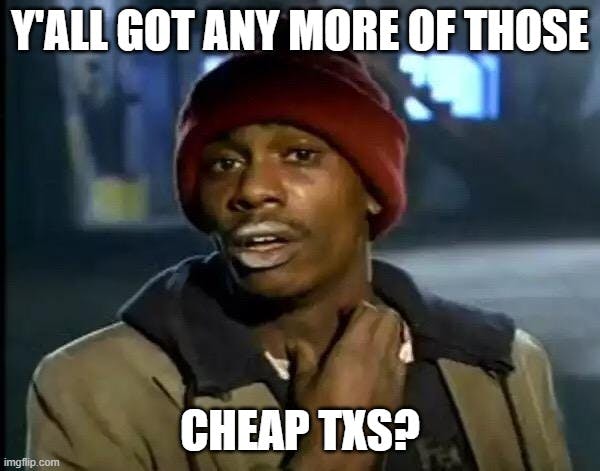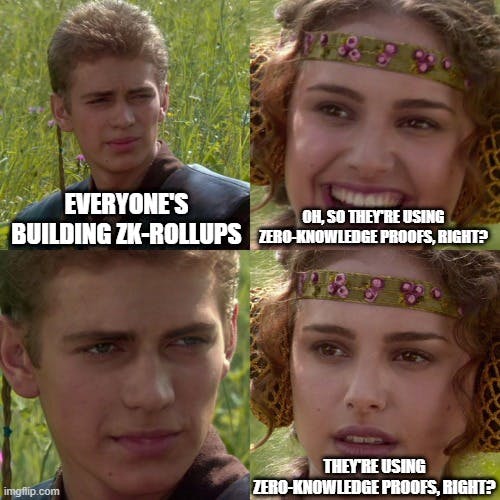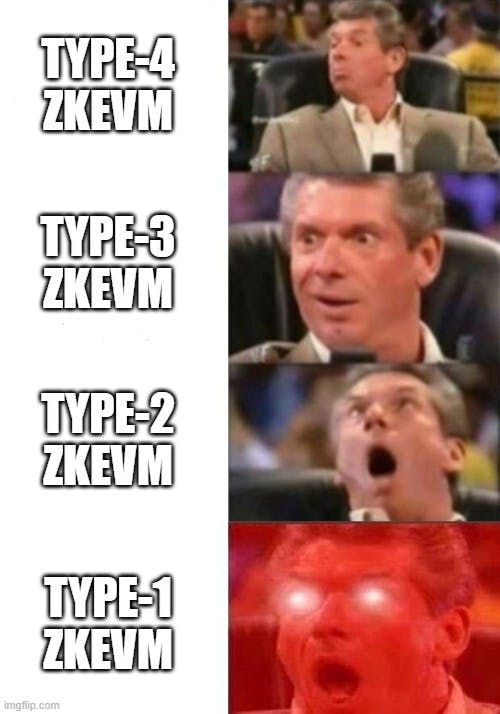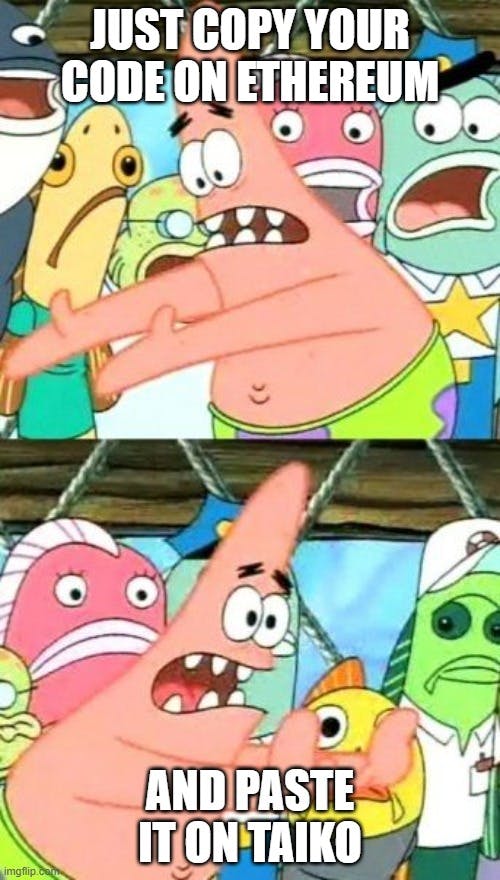This article is published as part of the Ethereum.org Writers Cohort. Thank you Matt Finestone for feedback.
This piece may contain factual and other errors that I’m simply not aware of. I’m just a curious amateur learning about blockchain and writing along the way. Take everything written here with a grain of salt and do your own research.
Also, none of this is financial advice.
Taiko, in my humble opinion, is one of the most exciting Ethereum rollup projects. It’s still in the early development stages, so I wanted to write a short FAQ about what Taiko is, how it works, and what it’s building towards.
Here it is.
What is Taiko?
I presume you already know what Ethereum is. Taiko wants to extend Ethereum and make it better. What’s wrong with Ethereum, you say? Well, as great and powerful as it is, Ethereum is currently not scalable — it gets very expensive to use once activity picks up on the network.
That’s what Taiko wants to do — scale Ethereum while maintaining its foundational tech and cultural ethos unchanged.
How is Taiko going to scale Ethereum?
Taiko uses a technology called rollups. What rollups do is take a bunch of transactions on Ethereum, roll them up in a single batch, and then execute them off-chain. This way, instead of executing transactions one by one and paying a gas fee for each, thousands of them can be processed in a single batch.
For users, this means lower gas fees and higher throughput without losing Ethereum’s security.

You said that Taiko will make transacting on Ethereum cheap. How cheap?
Taiko is still in its early days, so exactly how cheap it’s going to be is still unknown. But the expectation is that, in the long term, it’s going to cost a few cents to transact on Taiko.
I’ve also heard something about zero-knowledge proofs. Does Taiko have to do anything with them?
Yes! Zero-knowledge proofs (ZKPs) are an integral part of the Taiko protocol. Here’s how Taiko utilizes ZKPs.
Remember when we said that rollups execute batches of transactions off-chain? How exactly does Ethereum know whether those transactions were executed correctly? It knows that because when a rollup executes a batch of transactions, it sends a ZKP to Ethereum to prove that the rollup did everything correctly. And since ZKPs are one of the most magical things in the universe, Ethereum can be sure that they tell the truth and the transactions are valid.
Taiko uses ZK-SNARKs, a specific type of ZKPs. ZK-SNARKs are known to be lighter than ZK-STARKs, another type of ZKPs, and take less time to verify. They also require less gas, offering cheaper transactions.
Because Taiko combines rollup and ZKP technologies, it’s also called a ZK-rollup.
P.S. Do you want to hear a secret?

Sure, what’s the secret?
No current ZK-EVM, including Taiko, uses actual zero-knowledge proofs. What they use are validity proofs — proofs that have the succinctness and soundness properties, but don’t have the privacy-enabling one.
So yes, the terms “ZK-rollup” or “ZK-EVM” are a misnomer. But validity proofs are still magical!
OK, that’s interesting! You just called Taiko a “ZK-EVM”. What’s that?
A ZK-EVM is a special iteration of the Ethereum Virtual Machine that accommodates every EVM computation with a validity proof. In other words, ZK-EVMs verify each input and output of smart contracts — just what ZK-rollups do with batched transactions.
Taiko is a general-purpose ZK-rollup that’s compatible with the EVM. Put differently, Taiko is both a ZK-rollup and a ZK-EVM.
Whew, I don’t think I’ve ever seen so many new, exotic terms in one place. Is there a place where I could look them up in the future?
I know that it can be overwhelming — and, frankly, confusing — at first. That’s why Taiko has created a rollup glossary. If you ever find yourself wondering what a specific rollup term means, chances are you’ll find it in the glossary. And if you want to edit or add a new term, you can always do so — the glossary is open-source and community-owned.
Now, did you have any other questions?

Yes, thank you. How is Taiko different from other Ethereum ZK-EVMs?
Remember when we said that Taiko wants to be identical to Ethereum? That’s exactly what sets Taiko apart from other ZK-EVMs because Taiko is the only one currently building to become Ethereum-equivalent.
An Ethereum-equivalent ZK-EVM is also known as a type-1 ZK-EVM. Type-1 ZK-EVMs like Taiko strive for full Ethereum-equivalence and don’t change a thing about the Ethereum system. They’re also the only ones that will be able to verify Ethereum blocks in the future.
There are other types of ZK-EVMs but, as Vitalik pointed out, all ZK-EVMs that aren’t currently Ethereum-equivalent will, most likely, move towards equivalence in the long term. Taiko has an advantage here since it’s been building its type-1 ZK-EVM since early 2021.
On top of that, Taiko intends to launch on Ethereum with a set of decentralized proposers and provers. Instead of focusing on efficiency, the team aims to prioritize decentralization and permissionlessness. As far as I know, all other rollups prioritize efficiency over decentralization.
What about developers? How hard is it to build on Taiko?
Building on Taiko is as easy as it gets. That’s because Taiko is Ethereum-equivalent, which means that developers can build and migrate their dapps to Taiko without changing the code.
P.S. Do you want to hear another secret?

Another one?!
Yup! If you want to build on Taiko but are waiting for a new testnet, you can simply deploy your dapp on, say, the Sepolia testnet. Once Taiko has a working testnet, all you’ll need to do is copy-paste the code and deploy it on Taiko.
I know it sounds boring, but this is actually Taiko’s superpower.
Is Taiko open-source?
Taiko is open-source, decentralized, and community-focused. Anyone can contribute to Taiko. Check out the contributing guide to find out how to do it.
OK, but it can’t be all so rosy. What are the challenges Taiko is facing?
There are challenges, of course.
First, ZK-EVMs are very new. They’re also incredibly complex to build. That’s a challenge every ZK-EVM team is currently facing.
Second, Ethereum wasn’t designed to be compatible with validity proofs. Remember when we talked about teams making changes to favor efficiency over compatibility? Since Taiko is favoring compatibility and wants to be Ethereum-equivalent, this means that generating validity proofs takes longer.
However, proof generation time is expected to decrease over time. On top of that, there are multiple design tricks to speed up proof generation without sacrificing equivalence.
And third, while Taiko intends to launch as decentralized as possible, it’ll still be on some sort of training wheels. This means that there will be some centralization aspects like smart contract upgradeability in the short term, but the project aims to become fully decentralized with time.

When can I use Taiko?
Taiko expects to launch on Ethereum in early 2024. In the meantime, Taiko has launched — and will launch — testnets to test specific parts of its protocol. For example, the first testnet had permissionless proposers. And the second testnet had permissionless provers.
The next Taiko testnet will launch in a few weeks. Check Taiko’s roadmap for more details.
Does Taiko have a token?
No, Taiko currently doesn’t have a token. But it will likely have one once there’s a need for it.
My head is hurting already but I have one last question. What does “Taiko” mean?
The word “Taiko” comes from an old Chinese saying 鼓作气 (Yīgǔzuòqì). The literal meaning of the saying is that the first drum beat arouses courage. The implied meaning of the idiom is to “accomplish a task or goal in one intense effort.” I’ve written about the story the idiom comes from here.
Taiko (太鼓) also means a “drum” in Japanese. For Taiko the rollup, Taiko is the drum that arouses courage and leads to accomplishing goals.
If you want to learn more about Taiko, visit Taiko’s website, follow on Twitter, and check the latest developments on GitHub.
If you have any other questions, come to Taiko’s Discord server and ask away!